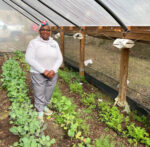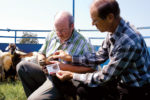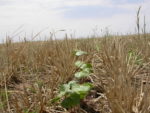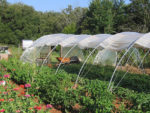Showing 1-6 of 6 results

Pest Exclusion Systems for Pest Management in Vegetable Production Across the Southeast
In organic vegetable production, and in situations where farmers are seeking to reduce chemical applications, Integrated Pest Management (IPM) strategies are recommended to exclude pests in both opens fields and in high tunnels. The principles of pest exclusion involve separating the insect pest from the host plant and protecting the crop at a specific growth stage. Careful planning of both materials selected and management design are important to keeping pests out of a cash crop. This bulletin provides data and information from on-farm demonstrations on the use of pest exclusion systems. Pest exclusion systems use shade cloths as a barrier around high tunnels, low tunnels and hoop houses to exclude insect pests.

FAMACHA
FAMACHA is a diagnostic tool to help farmers identify parasite infection in small ruminants, allowing them to cut the cost of deworming agents by targeting treatments only to infected animals. Training is required before purchase.

Private Landowners Guide to Forest Certification in the South
"Private Landowners' Guide to Forest Certification in the South," developed by the LSU Ag Center and Mississippi State University Extension, helps forest landowners understand forest certification.

Economics of Cover Crops II (Part 1): USDA-NRCS Cover Crop Economics Decision Support Tool
Developed by USDA-Natural Resources Conservation Service (NRCS) economists, Lauren Cartwright (Missouri) and Bryon Kirwan (Illinois), The Cover Crop Economic Decision Support Tool is designed to help producers, landowners, planners, and others make informed decisions when considering adding cover crops to their production systems.

High Tunnel Pest Exclusion System
Insect pests are one of the major problems in organic production systems. Organic IPM practice consists of a three-tiered approach consisting of systems-based practices, mechanical tactics, and biorational insecticides. Mechanical tactics encourage the use of physical barriers for pest exclusion. This bulletin provides preliminary research data and field observations about the success of shade cloths, or high tunnel pest exclusion (HTPE) systems, as a more permanent barrier system around the high tunnels.

High Tunnel Crop Production Handbook
A high tunnel crop production handbook from Alabama Cooperative Extension.